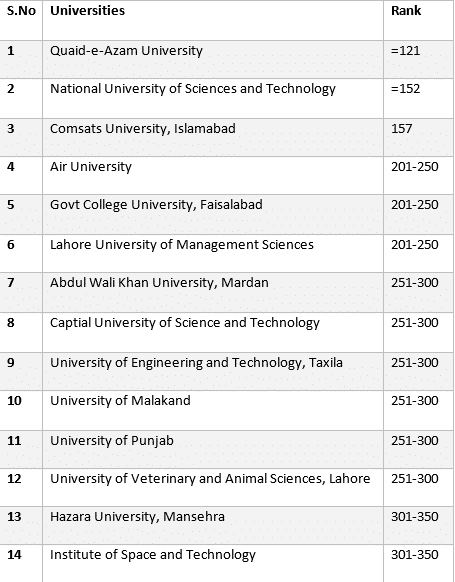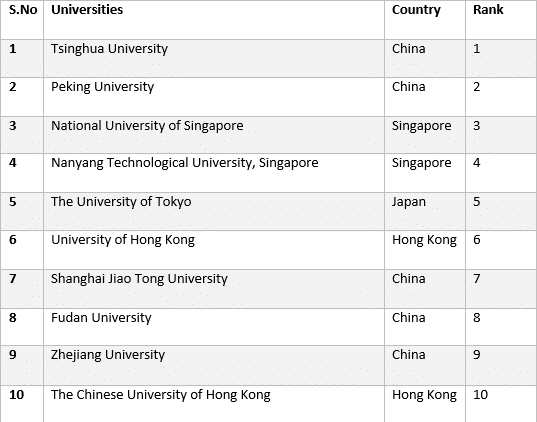88 Pakistani universities have featured in the Times Higher Education (THE) Asia University Rankings 2024. While 41 national institutes have been ranked by THE, the remaining have been granted the status of a ‘reporter’ on the list. With a total of 88 universities making the cut, Pakistan’s absence highlights challenges faced by its higher education sector in competing at a regional level.
Quaid-e-Azam University, which held the 98th position in 2023, has experienced a significant decline, now landing at number 121. Following closely behind are NUST and COMSATS, securing ranks at 152 and 157, respectively.
Here is the list of Pakistani universities that made it to the list of Asia University Ranking, other than these are granted the status of ‘Reporter’.
The dominance of Japanese and Indian universities is particularly noteworthy this year, with Japan leading the pack with 119 institutions featured in the ranking, followed closely by India with 91. Mainland China emerges as a frontrunner in the top 100, boasting 33 universities, while South Korea follows suit with 16 institutions securing positions.
Here is the list of Top 10 Universities on THE Asia University Rankings 2024.
The 2024 edition of the Asia University Ranking encompasses a total of 739 universities hailing from 31 territories. Despite the significant representation, the absence of Pakistani universities from the upper echelons of the ranking underscores the imperative for strategic reforms and investments within the country’s higher education sector. As global competition intensifies, bridging the gap and enhancing the competitiveness of Pakistani universities remains paramount to fostering innovation, research, and academic excellence on a regional and global scale.


























Non availability of digital resources to the universities has impacted the ranking of the universities due to decrease in research
The recent decline of Pakistani universities in the Asian rankings has raised concerns about the state of higher education in the country. A significant factor contributing to this fall is the reduction in electronic resources provided by the Higher Education Commission (HEC) of Pakistan. The HEC’s decision to curtail access to vital electronic databases and journals has had a direct impact on the research output of universities, which is a critical metric in global academic rankings.
The Times Higher Education (THE) Asia University Rankings 2024 have shown that not a single Pakistani university made it to the top 100, with Quaid-e-Azam University, previously ranked 98th, now at 121st1. Similarly, the QS Asia University Rankings 2024 reveal only three Pakistani universities making the cut, a sharp decline from 15 in the previous year2. This downward trend is alarming and suggests that the reduction in electronic resources has hindered researchers’ ability to stay competitive on an international level.
Research publications are the lifeblood of academic institutions, contributing to knowledge advancement and innovation. The availability of electronic resources is crucial for researchers to access the latest studies, collaborate internationally, and publish their work in reputable journals. The HEC’s cutback on these resources seems to be a step backward for academic progress in Pakistan.
It is imperative for the HEC to reconsider its strategy and reinvest in the digital library program. By restoring full access to electronic resources, Pakistani universities can regain their footing in the Asian rankings and continue to contribute valuable research to the global academic community. The future of Pakistan’s higher education and its international standing depends on the actions taken today to nurture and support its research ecosystem.
It’s concerning to see Pakistani universities absent from the top 100 of THE Asia University Rankings 2024. Understanding the reasons behind this omission is crucial.
For years, Pakistani institutions have boasted strong research output, but there’s been a noticeable shift in the past year. One significant factor contributing to this decline is the restricted access researchers face to scientific content. Many find themselves having to pay exorbitant fees to access vital research materials.
This raises the question: what is the current role of the Higher Education Commission (HEC)? Historically, this organization has played a pivotal role in supporting researchers and fostering academic excellence. However, it’s essential to assess what steps they are taking now to address the challenges facing researchers, particularly regarding access to scholarly resources. Are they advocating for policies that ensure equitable access to research materials? Are there initiatives in place to bolster research infrastructure and support academic institutions?
As stakeholders in Pakistan’s academic landscape, it’s imperative that we scrutinize and address these issues to ensure that our universities can compete on a global scale and continue to contribute meaningfully to the advancement of knowledge and innovation.